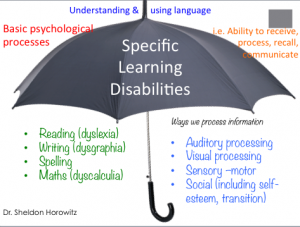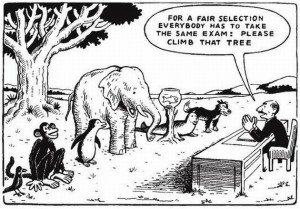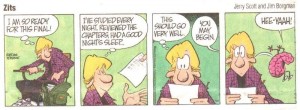“Teaching a room full of learners the same thing in the same way over the same time span with the same supports and expecting good results from all students has never happened and never will.” Tomlinson
Last week I facilitated a couple of workshops on working with non funded students. They were well attended, interactive workshops with a mix of teacher and education support staff who were very eager to share their expertise and experiences with colleagues and other staff from different schools and sectors. One school even sent their whole education support unit!
Introduction
The morning sessions began with a quick discussion of the roles of teachers and education support staff and then covered specific learning disabilities with which students may present in schools. Many students who have experienced these learning difficulties are not funded but the impact it has on their learning and ability to work effectively in mainstream classes is similar to those who are funded. These difficulties can lead to withdrawal, behavioural issues, anti social behaviour and low self esteem. Our role as educators is to help these students overcome or compensate for their learning difficulties, funded or not. Below is a representation of Dr. Sheldon’s Horowitz‘s idea of the basic psychological process used in understanding and using language. His explanatory videos are great, easy to follow and well explained.
Strategies
I then presented some strategies and ideas that can be used in the classroom to assist the students with learning difficulties in accessing the curriculum. I believe that if we take the time to assess what the students know and then plan a variety of activities that take into account learning preferences, abilities and readiness of students, our classes would be more engaging not just for those with difficulties but also the mainstream cohort as well as those students who display particularly well developed strengths in specific areas.
Differentiation and modification
The day continued with a focus on differentiation and modification. What is the difference? It is surprising, based on my own experience in schools, that many teachers and education support staff have a limited understanding of these two methods. I often come across so called ‘modified’ tasks where the teacher has simply removed the last few questions on the test or asked that the student completes every second question. This folks is not modification. I have found however, that teachers implicitly do differentiate their curriculum but may not be aware of the many more ways this could be done so all students are engaged in deep learning.
The ‘guru’ of differentiation is Carol Tomlinson. Her premise is that there are essentially 3 P’s in differentiation i.e. Presentation, Process and Product.
- How are you going to teach it?
- What do you want the students to know and do?
Process
- How will the learning be done?
Product
- How will the students demonstrate learning?
When modifying work for students, teachers and education support staff must take into account the abilities, readiness and learning preferences of the child. Before modifying work for any student, especially those who are not funded, the school should seek permission from the parent. In some cases the parent will not give permission, and while this is disappointing, teachers must abide by this decision although they can make extra efforts to ensure the child has access to a differentiated curriculum. This is one where by the delivery of content is varied, and accommodations such as more time, different settings, choice in presentation and response are offered.
 Simply, the difference between differentiation and modification comes down to the expectation of work to be assessed. In differentiation there is no change to the assessment criteria or rubric but a modified task requires us to make changes to the assessment criteria. In all cases, modifications are instructional or test adaptations that allow the student to demonstrate what he knows or can do, but they also reduce the target skill in some way. So if a student is provided with a modification, generally it will lower the performance expectations. It often reduces the learning expectations or affects the content in such a way that what is being taught or tested is fundamentally changed.
Simply, the difference between differentiation and modification comes down to the expectation of work to be assessed. In differentiation there is no change to the assessment criteria or rubric but a modified task requires us to make changes to the assessment criteria. In all cases, modifications are instructional or test adaptations that allow the student to demonstrate what he knows or can do, but they also reduce the target skill in some way. So if a student is provided with a modification, generally it will lower the performance expectations. It often reduces the learning expectations or affects the content in such a way that what is being taught or tested is fundamentally changed.
When planning for either differentiated or modified tasks, there are three questions we must ask ourselves:
- What do I want students to know?
- What do I want students to understand?
- What do I want students to do?
Collaborative task
The afternoon was dedicated to activities that allowed the participants to use their own assessment tasks, or mine, to make accommodations or modify based on student profiles that I provided. We then came together and discussed our learning.
The day ended with an example of what I think a student profile should contain so that informed decisions about the student’s individual learning can be made.
Feedback
While two out of 53 participants thought the workshop was too focused on education support staff and one thought it more valuable for early career teachers, overall, the feedback was very positive (see below) and many participants took away ideas and strategies that I hope they have begun implementing in their classes. For me it’s always about the students, so anything extra we can do to improve their learning experience is very worthwhile and very rewarding for us as educators.
“Jo touched on many ideas that I can share and implement at my school.” Anita
“Wonderful & engaging presentation” Anon
“The course was quite informative, found out about a few strategies which can be easily applied at our workplace.” Claudine
“Very informative, presented so well. Enjoyable” Anne
“Very relaxed and informative conference.” Anon
“Presentation was very comprehensive and information was very beneficial to my teaching.” Anon
“Excellent speaker. Fantastic, useful info/strategies to put into classroom practice.” Debra
“A great presenter with lots of ideas, hints, etc.” Alexandra
Many thanks are extended to all who participated last week in Geelong and at the Mulgrave venue!
If you’d like to learn more, why not register for the workshop delivered through Critical Agendas. I’ll be running similar workshops in Geelong on May 29 and Bulleen on June 6.
Drop me a line, or comment below. I’d very much like to know what measures you take to support non-funded special needs students at your school.
Thanks for reading! 🙂












